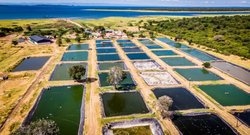Undercurrent News | 13 April 2020
By Neil Ramsden
Coronavirus may help spur aquaculture investments in Africa
By Neil Ramsden
The African aquaculture sector has become an even more appealing investment proposition in light of the COVID-19 pandemic, Flavio Corsin -- head of aquaculture with IDH, the Sustainable Trade Initiative -- proposed to Undercurrent News.
When coronavirus first spread throughout China, the availability and price of products like frozen tilapia -- an important import for Sub-Saharan Africa -- dropped/rose respectively. Some 90% of Africa's farmed fish consumption is imported from Asia, with Sub-Saharan Africa producing less than 1% of the global total.
"The retail price for fillets in [Kenyan capital] Nairobi now is around €17 per kilogram," Corsin said, speaking in late March. "That's inflated, it's almost double the normal price."
"Actually everything in African countries is very expensive, and that presents a huge market opportunity for production. The problem really is logistics, but those things can grow with proper investment."
The African continent has been experiencing a seafood deficit since 2001 and this deficit has been growing by 13% every year, according to a blog post Corsin wrote late in 2019.
In a "COVID, and post-COVID" world, African countries are likely to refocus on meeting their own food needs internally. Some countries, such as Nigeria, have in the past tried to drive this through import quotas, which limited the amount of fish that could enter the market from outside.
"Sub-Saharan Africa is a huge market for fish, so it's appealing for investment. It's something we've been working on," said Corsin, adding that IDH has been working with investment fund Aqua-Spark to spur investments there too, and that this work could be accelerated by the current crisis.
There are a lot of opportunities there -- some good, some bad, some difficult, hence the need for finding the right partners and organizations, he said.
With that in mind, IDH is also working with FMO, the Dutch development bank -- which last year granted Zambian fully integrated tilapia operation Yalelo a $10.5 million senior secured loan facility -- to draw up guidelines for investing in African aquaculture.
"Together we're looking at how to get investors to understand the space a bit better and to get closer to it," Corsin told Undercurrent. "This isn't going to be written for the Rabobanks of this world, because they're already large-scale equity investors that know the sector quite well. It's more for those financial institutions that see the opportunity, but they don't quite know how to do it."
While it is very hard to control African imports, there is already a trend in Sub-Saharan Africa towards investments going into local sourcing; Corsin pointed to deals outside of aquaculture, but in the food sector.
"This is a trend that is already happening, and I think more fish is going to be produced and the market is ready to accept it," he said. "The problem really is how can you increase the production."
Investors may be put off of making deals in Africa by general uncertainty, or high valuations of companies, he noted.
"But if there is going to be another COVID, I prefer having at least part of my investment in a country which will absorb the products, rather than in countries that are heavily reliant on exports."
"Then, if you want to the same thing in Europe, and produce for Europe, the amount of investment for the RAS [recirculating aquaculture systems] is going to be quite tight; it becomes quite appealing from a business perspective. Do I want to invest $100m in a RAS in Germany, or wherever, or do I want to invest a couple of million into developing production in Kenya, Uganda, where I can actually recover the investment quite quickly if everything works."














